- Home
- P. G. Wodehouse
Wodehouse On Crime Page 2
Wodehouse On Crime Read online
Page 2
“Amazing the things people will leave in trains,” said a Small Lager. “Bags … umbrellas … even stuffed chimpanzees, occasionally, I’ve been told. I heard a story the other day — ”
My nephew Cyril (said Mr. Mulliner) had a greater passion for mystery stories than anyone I have ever met. I attribute this to the fact that, like so many interior decorators, he was a fragile, delicate young fellow, extraordinarily vulnerable to any ailment that happened to be going the rounds. Every time he caught mumps or influenza or German measles or the like, he occupied the period of convalescence in reading mystery stories. And, as the appetite grows by what it feeds on, he had become, at the time at which this narrative opens, a confirmed addict. Not only did he devour every volume of this type on which he could lay his hands, but he was also to be found at any theater which was offering the kind of drama where skinny arms come unexpectedly out of the chiffonier and the audience feels a mild surprise if the lights stay on for ten consecutive minutes.
And it was during a performance of The Grey Vampire at the St. James’s that he found himself sitting next to Amelia Bassett, the girl whom he was to love with all the stored-up fervour of a man who hitherto had been inclined rather to edge away when in the presence of the other sex.
He did not know her name was Amelia Basset. He had never seen her before. All he knew was that at last he had met his fate, and for the whole of the first act he was pondering the problem of how he was to make her acquaintance.
It was as the lights went up for the first intermission that he was aroused from his thoughts by a sharp pain in the right leg. He was just wondering whether it was gout or sciatica when, glancing down, he perceived that what had happened was that his neighbour, absorbed by the drama; had absentmindedly collected a handful of his flesh and was twisting it in an ecstasy of excitement.
It seemed to Cyril a good point d’appui.
“Excuse me,” he said.
The girl turned. Her eyes were glowing, and the tip of her nose still quivered.
“I beg your pardon?’’
“My leg,” said Cyril. “Might I have it back, if you’ve finished with it?’’
The girl looked down. She started visibly.
“I’m awfully sorry,” she gasped.
“Not at all,” said Cyril. “Only too glad to have been of assistance.”
“I got carried away.”
“You are evidently fond of mystery plays.”
“I love them.”
“So do I. And mystery novels?”
“Oh, yes!”
“Have you read Blood on the Banisters?”
“Oh, yes! I thought it was better than Severed Throats. ”
“So did I,” said Cyril. “Much better. Brighter murders, subtler detectives, crisper clues … better in every way.”
The two twin souls gazed into each other’s eyes. There is no surer foundation for a beautiful friendship than a mutual taste in literature.
“My name is Amelia Bassett,” said the girl.
“Mine is Cyril Mulliner. Bassett?” He frowned thoughtfully. “The name seems familiar.”
“Perhaps you have heard of my mother. Lady Bassett. She’s rather a well-known big-game hunter and explorer. She tramps through jungles and things. She’s gone out to the lobby for a smoke. By the way” — she hesitated — “if she finds us talking, will you remember that we met at the Polterwoods’?”
“I quite understand.”
“You see, mother doesn’t like people who talk to me without a formal introduction. And, when mother doesn’t like anyone, she is so apt to hit them over the head with some hard instrument.”
“I see,” said Cyril. “Like the Human Ape in Gore by the Gallon.”
“Exactly. Tell me,” said the girl, changing the subject, “if you were a millionaire, would you rather be stabbed in the back with a paper-knife or found dead without a mark on you, staring with blank eyes at some appalling sight?”
Cyril was about to reply when, looking past her, he found himself virtually in the latter position. A woman of extraordinary formidableness had lowered herself into the seat beyond and was scrutinising him keenly through a tortoiseshell lorgnette. She reminded Cyril of Wallace Beery.
“Friend of yours, Amelia?” she said.
“This is Mr. Mulliner, mother. We met at the Polterwoods’.”
“Ah?” said Lady Bassett.
She inspected Cyril through her lorgnette.
“Mr. Mulliner,” she said, “is a little like the chief of the Lower Isisi — though, of course, he was darker and had a ring through his nose. A dear, good fellow,” she continued reminiscently, “but inclined to become familiar under the influence of trade gin. I shot him in the leg.”
“Er — why?” asked Cyril.
“He was not behaving like a gentleman,” said Lady Bassett primly.
“After taking your treatment,” said Cyril, awed, “I’ll bet he could have written a Book of Etiquette.”
“I believe he did,” said Lady Bassett carelessly. “You must come and call on us some afternoon, Mr. Mulliner. I am in the telephone book. If you are interested in man-eating pumas, I can show you some nice heads.”
The curtain rose on act two, and Cyril returned to his thoughts. Love, he felt joyously, had come into his life at last. But then so, he had to admit, had Lady Bassett. There is, he reflected, always something.
I will pass lightly over the period of Cyril’s wooing. Suffice it to say that his progress was rapid. From the moment he told Amelia that he had once met Dorothy Sayers, he never looked back. And one afternoon, calling and finding that Lady Bassett was away in the country, he took the girl’s hand in his and told his love.
For a while all was well. Amelia’s reactions proved satisfactory to a degree. She checked up enthusiastically on his proposition. Falling into his arms, she admitted specifically that he was her Dream Man.
Then came the jarring note.
“But it’s no use,” she said, her lovely eyes filling with tears. “Mother will never give her consent.”
“Why not?” said Cyril, stunned. “What is it she objects to about me?”
“I don’t know. But she generally alludes to you as ‘that pipsqueak.’ ”
“Pipsqueak?” said Cyril. “What is a pipsqueak?”
“I’m not quite sure, but it’s something mother doesn’t like very much. It’s a pity she ever found out that you are an interior decorator.”
“An honourable profession,” said Cyril, a little stiffly.
“I know; but what she admires are men who have to do with the great open spaces.”
“Well, I also design ornamental gardens.”
“Yes,” said the girl doubtfully, “but still — ”
“And, dash it,” said Cyril indignantly, “this isn’t the Victorian age. All that business of Mother’s Consent went out twenty years ago.”
“Yes, but no one told mother.”
“It’s preposterous!” cried Cyril. “I never heard such rot. Let’s just slip off and get married quietly and send her a picture postcard from Venice or somewhere, with a cross and a ‘This is our room. Wish you were with us’ on it.”
The girl shuddered.
“She would be with us,” she said. “You don’t know mother. The moment she got that picture postcard, she would come over to wherever we were and put you across her knee and spank you with a hair-brush. I don’t think I could ever feel the same towards you if I saw you lying across mother’s knee, being spanked with a hair-brush. It would spoil the honeymoon.”
Cyril frowned. But a man who has spent most of his life trying out a series of patent medicines is always an optimist.
“There is only one thing to be done,” he said. “I shall see your mother and try to make her listen to reason. Where is she now?”
“She left this morning for a visit to the Winghams in Sussex.”
“Excellent! I know the Winghams. In fact, I have a standing invitation to go and stay with
them whenever I like. I’ll send them a wire and push down this evening. I will oil up to your mother sedulously and try to correct her present unfavourable impression of me. Then, choosing my moment, I will shoot her the news. It may work. It may not work. But at any rate I consider it a fair sporting venture.”
“But you are so diffident, Cyril. So shrinking. So retiring and shy. How can you carry through such a task?”
“Love will nerve me.”
“Enough, do you think? Remember what mother is. Wouldn’t a good, strong drink be more help?”
Cyril looked doubtful.
“My doctor has always forbidden me alcoholic stimulants. He says they increase the blood pressure.”
“Well, when you meet mother, you will need all the blood pressure you can get. I really do advise you to fuel up a little before you see her.”
“Yes,” agreed Cyril, nodding thoughtfully. “I think you’re right. It shall be as you say. Good-bye, my angel one.”
“Good-bye, Cyril, darling. You will think of me every minute while you’re gone?”
“Every single minute. Well, practically every single minute. You see, I have just got Horatio Slingsby’s latest book. Strychnine in the Soup, and I shall be dipping into that from time to time. But all the rest of the while… . Have you read it, by the way?”
“Not yet. I had a copy, but mother took it with her.”
“Ah? Well, if I am to catch a train that will get me to Barkley for dinner, I must be going. Good-bye, sweetheart, and never forget that Gilbert Glendale in The Missing Toe won the girl he loved in spite of being up against two mysterious stranglers and the entire Black Moustache gang.”
He kissed her fondly, and went oft to pack.
Barkley Towers, the country seat of Sir Mortimer and Lady Wingham, was two hours from London by rail. Thinking of Amelia and reading the opening chapters of Horatio Slingsby’s powerful story, Cyril found the journey pass rapidly. In fact, so preoccupied was he that it was only as the train started to draw out of Barkley Regis station that he realized where he was. He managed to hurl himself on to the platform just in time.
As he had taken the five-seven express, stopping only at Gluebury Peveril, he arrived at Barkley Towers at an hour which enabled him not only to be on hand for dinner but also to take part in the life-giving distribution of cocktails which preceded the meal.
The house-party, he perceived on entering the drawingroom, was a small one. Besides Lady Bassett and himself, the only visitors were a nondescript couple of the name of Simpson, and a tall, bronzed, handsome man with flashing eyes who, his hostess informed him in a whispered aside, was Lester Mapledurham (pronounced Mum), the explorer and big-game hunter.
Perhaps it was the oppressive sensation of being in the same room with two explorers and big-game hunters that brought home to Cyril the need for following Amelia’s advice as quickly as possible. But probably the mere sight of Lady Bassett alone would have been enough to make him break a lifelong abstinence. To her normal resemblance to Wallace Beery she appeared now to have added a distinct suggestion of Victor McLaglen, and the spectacle was sufficient to send Cyril leaping toward the cocktail tray.
After three rapid glasses he felt a better and a braver man. And so lavishly did he irrigate the ensuing dinner with hock, sherry, champagne, old brandy and port, that at the conclusion of the meal he was pleased to find that his diffidence had completely vanished. He rose from the table feeling equal to asking a dozen Lady Bassetts for their consent to marry a dozen daughters.
In fact, as he confided to the butler, prodding him genially in the ribs as he spoke, if Lady Bassett attempted to put on any dog with him, he would know what to do about it. He made no threats, he explained to the butler, he simply stated that he would know what to do about it. The butler said “Very good, sir. Thank you, sir,” and the incident closed.
It had been Cyril’s intention — feeling, as he did, in this singularly uplifted and dominant frame of mind — to get hold of Amelia’s mother and start oiling up to her immediately after dinner. But, what with falling into a doze in the smoking-room and then getting into an argument on theology with one of the under-footmen whom he met in the hall, he did not reach the drawing-room until nearly half-past ten. And he was annoyed, on walking in with a merry cry of “Lady Bassett! Call for Lady Bassett!’’ on his lips, to discover that she had retired to her room.
Had Cyril’s mood been even slightly less elevated, this news might have acted as a check on his enthusiasm. So generous, however, had been Sir Mortimer’s hospitality that he merely nodded eleven times, to indicate comprehension, and then, having ascertained that his quarry was roosting in the Blue Room, sped thither with a brief “Tally-ho!”
Arriving at the Blue Room, he banged heartily on the door and breezed in. He found Lady Bassett propped up with pillows. She was smoking a cigar and reading a book. And that book, Cyril saw with intense surprise and resentment, was none other than Horatio Slingsby’s Strychnine in the Soup.
The spectacle brought him to an abrupt halt.
“Well, I’m dashed!” he cried. “Well, I’m blowed! What do you mean by pinching my book?”
Lady Bassett had lowered her cigar. She now raised her eyebrows.
“What are you doing in my room, Mr. Mulliner?”
“It’s a little hard,” said Cyril, trembling with self-pity. “I go to enormous expense to buy detective stories, and no sooner is my back turned than people rush about the place sneaking them.”
“This book belongs to my daughter Amelia.”
“Good old Amelia!” said Cyril cordially. “One of the best.”
“I borrowed it to read in the train. Now will you kindly tell me what you are doing in my room, Mr. Mulliner?”
Cyril smote his forehead.
“Of course. I remember now. It all comes back to me. She told me you had taken it. And, what’s more. I’ve suddenly recollected something which clears you completely. I was hustled and bustled at the end of the journey. I sprang to my feet, hurled bags on to the platform — in a word, lost my head. And, like a chump, I went and left my copy of Strychnine in the Soup in the train. Well, I can only apologize.”
“You can not only apologize. You can also tell me what you are doing in my room.”
“What I am doing in your room?”
“Exactly.”
“Ah!” said Cyril, sitting down on the bed. “You may well ask.”
“I have asked. Three times.”
Cyril closed his eyes. For some reason, his mind seemed cloudy and not at its best.
“If you are proposing to go to sleep here, Mr. Mulliner,” said Lady Bassett, “tell me, and I shall know what to do about it.”
The phrase touched a chord in Cyril’s memory. He recollected now his reasons for being where he was. Opening his eyes, he fixed them on her.
“Lady Bassett,” he said, “you are, I believe, an explorer?”
“In the course of your explorations, you have wandered through many a jungle in many a distant land?”
“I have.”
“Tell me, Lady Bassett,” said Cyril keenly, “while making a pest of yourself to the denizens of those jungles, did you notice one thing? I allude to the fact that Love is everywhere — aye, even in the jungle. Love, independent of bounds and frontiers, of nationality and species, works its spell on every living thing. So that, no matter whether an individual be a Congo native, an American song-writer, a jaguar, an armadillo, a bespoke tailor, or a tsetse-tsetse fly, he will infallibly seek his mate. So why shouldn’t an interior decorator and designer of ornamental gardens? I put this to you. Lady Bassett.”
“Mr. Mulliner,” said his room-mate, “you are blotto!”
Cyril waved his hand in a spacious gesture, and fell off the bed.
“Blotto I may be,” he said, resuming his seat, “but, none the less, argue as you will, you can’t get away from the fact that I love your daughter Amelia.”
There was a tense pause.
&nb
sp; “What did you say?” cried Lady Bassett.
“When?” said Cyril absently, for he had fallen into a daydream and, as far as the intervening blankets would permit, was playing “This little pig went to market” with his companion’s toes.
“Did I hear you say … my daughter Amelia?”
“Grey-eyed girl, medium height, sort of browny-red hair,” said Cyril, to assist her memory. “Dash it, you must know Amelia. She goes everywhere. And let me tell you something, Mrs. — I’ve forgotten your name. We’re going to be married, if I can obtain her foul mother’s consent. Speaking as an old friend, what would you say the chances were?”
“Extremely slight.”
“Eh?”
“Seeing that I am Amelia’s mother… .”
Cyril blinked, genuinely surprised.
“Why, so you are! I didn’t recognize you. Have you been there all the time?”
“I have.”
Suddenly Cyril’s gaze hardened. He drew himself up stiffly.
“What are you doing in my bed?” he demanded.
“This is not your bed.”
“Then whose is it?”
“Mine.”
Cyril shrugged his shoulders helplessly.
“Well, it all looks very funny to me,” he said. “I suppose I must believe your story, but, I repeat, I consider the whole thing odd, and I propose to institute very strict enquiries. I may tell you that I happen to know the ringleaders. I wish you a very hearty good night.”
It was perhaps an hour later that Cyril, who had been walking on the terrace in deep thought, repaired once more to the Blue Room in quest of information. Running over the details of the recent interview in his head, he had suddenly discovered that there was a point which had not been satisfactorily cleared up.
“I say,” he said.
Lady Bassett looked up from her book, plainly annoyed.
“Have you no bedroom of your own, Mr. Mulliner?”
“Oh, yes,” said Cyril. “They’ve bedded me out in the Moat Room. But there was something I wanted you to tell me.”
“Well?”
“Did you say I might or mightn’t?”
“Might or mightn’t what?”

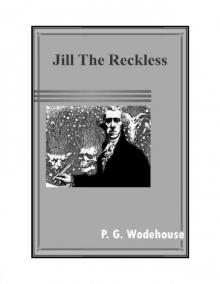 Jill the Reckless
Jill the Reckless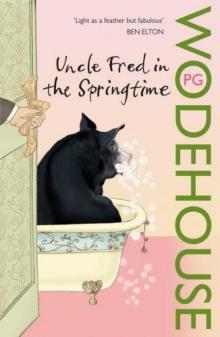 Uncle Fred in the Springtime
Uncle Fred in the Springtime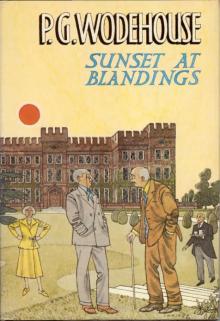 Sunset at Blandings
Sunset at Blandings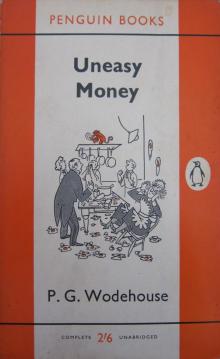 Uneasy Money
Uneasy Money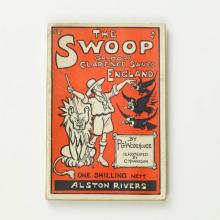 The Swoop! or, How Clarence Saved England: A Tale of the Great Invasion
The Swoop! or, How Clarence Saved England: A Tale of the Great Invasion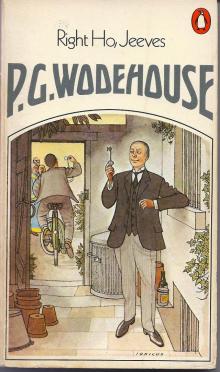 Right Ho, Jeeves
Right Ho, Jeeves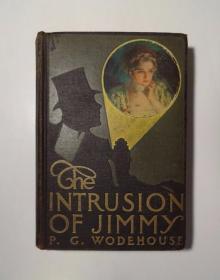 The Intrusion of Jimmy
The Intrusion of Jimmy The Jeeves Omnibus - Vol 1:
The Jeeves Omnibus - Vol 1: Aunts Aren't Gentlemen:
Aunts Aren't Gentlemen: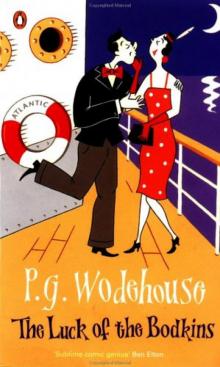 The Luck of the Bodkins
The Luck of the Bodkins The Little Nugget
The Little Nugget Money for Nothing
Money for Nothing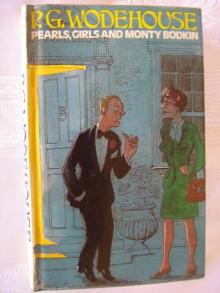 Pearls, Girls and Monty Bodkin
Pearls, Girls and Monty Bodkin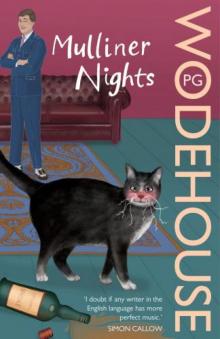 Mulliner Nights
Mulliner Nights Blandings Castle and Elsewhere
Blandings Castle and Elsewhere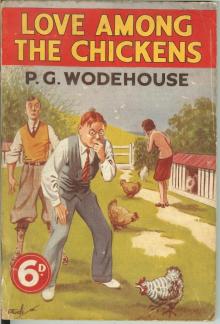 Love Among the Chickens
Love Among the Chickens Carry On, Jeeves!
Carry On, Jeeves!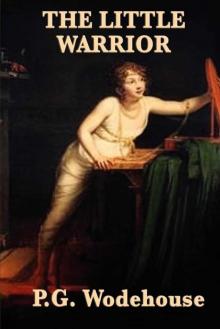 The Little Warrior
The Little Warrior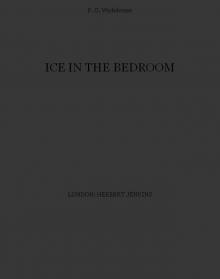 Ice in the Bedroom
Ice in the Bedroom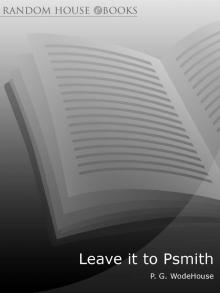 Leave It to Psmith
Leave It to Psmith Thank You, Jeeves:
Thank You, Jeeves: Money in the Bank
Money in the Bank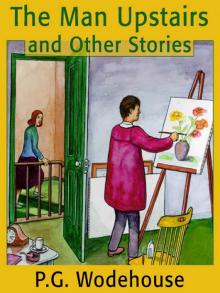 The Man Upstairs and Other Stories
The Man Upstairs and Other Stories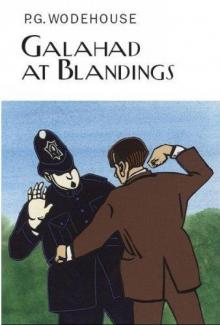 Galahad at Blandings
Galahad at Blandings The Jeeves Omnibus Vol. 5
The Jeeves Omnibus Vol. 5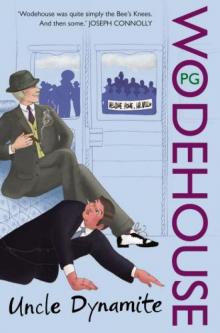 Uncle Dynamite
Uncle Dynamite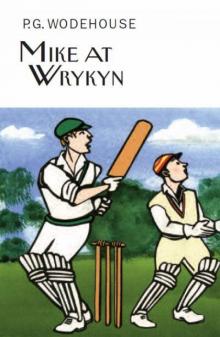 Mike at Wrykyn
Mike at Wrykyn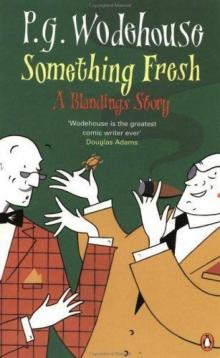 Something Fresh
Something Fresh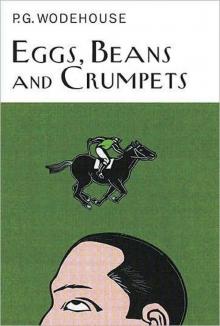 Eggs, Beans and Crumpets
Eggs, Beans and Crumpets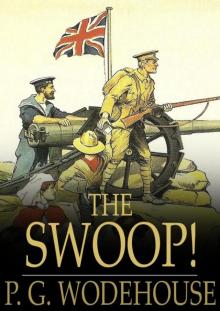 The Swoop: How Clarence Saved England (Forgotten Books)
The Swoop: How Clarence Saved England (Forgotten Books)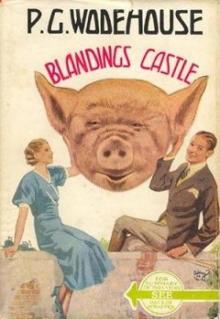 Blanding Castle Omnibus
Blanding Castle Omnibus Wodehouse at the Wicket: A Cricketing Anthology
Wodehouse at the Wicket: A Cricketing Anthology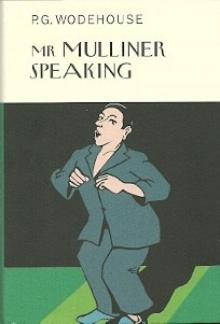 Mr. Mulliner Speaking
Mr. Mulliner Speaking Hot Water
Hot Water The Jeeves Omnibus - Vol 3: The Mating Season / Ring for Jeeves / Very Good, Jeeves
The Jeeves Omnibus - Vol 3: The Mating Season / Ring for Jeeves / Very Good, Jeeves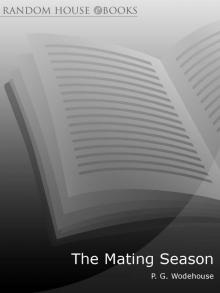 The Mating Season
The Mating Season Meet Mr. Mulliner
Meet Mr. Mulliner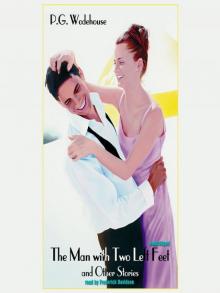 The Man with Two Left Feet, and Other Stories
The Man with Two Left Feet, and Other Stories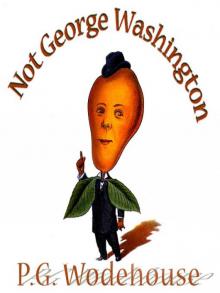 Not George Washington — an Autobiographical Novel
Not George Washington — an Autobiographical Novel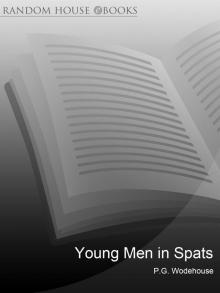 Young Men in Spats
Young Men in Spats The Jeeves Omnibus Vol. 4
The Jeeves Omnibus Vol. 4 A Pelican at Blandings:
A Pelican at Blandings: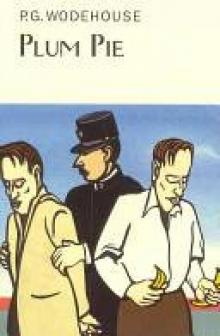 Plum Pie
Plum Pie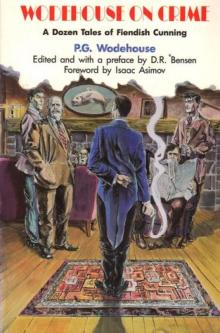 Wodehouse On Crime
Wodehouse On Crime The Jeeves Omnibus Vol. 2: Right Ho, Jeeves / Joy in the Morning / Carry On, Jeeves
The Jeeves Omnibus Vol. 2: Right Ho, Jeeves / Joy in the Morning / Carry On, Jeeves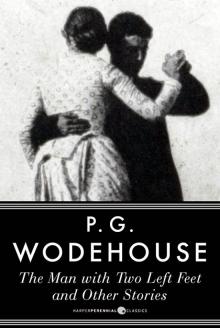 The Man With Two Left Feet
The Man With Two Left Feet Full Moon:
Full Moon: Jeeves and the Feudal Spirit:
Jeeves and the Feudal Spirit: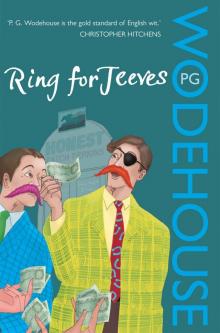 Ring For Jeeves
Ring For Jeeves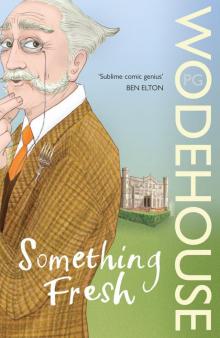 Something New
Something New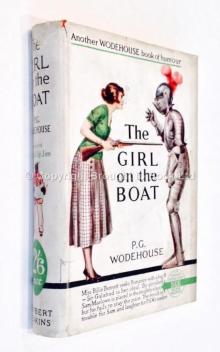 The Girl on the Boat
The Girl on the Boat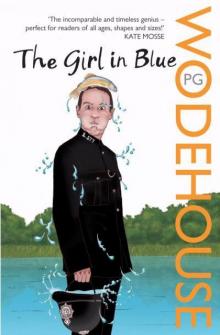 The Girl in Blue
The Girl in Blue Pigs Have Wings:
Pigs Have Wings: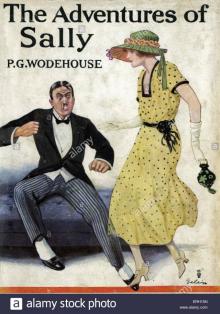 The Adventures of Sally
The Adventures of Sally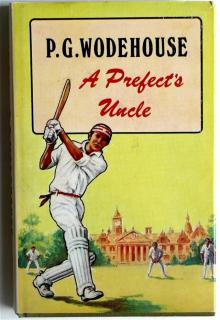 A Prefect's Uncle
A Prefect's Uncle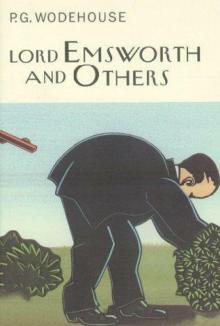 Lord Emsworth and Others
Lord Emsworth and Others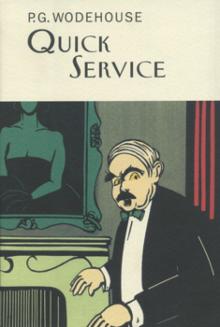 Quick Service
Quick Service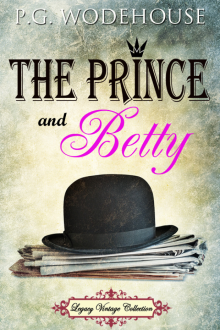 The Prince and Betty
The Prince and Betty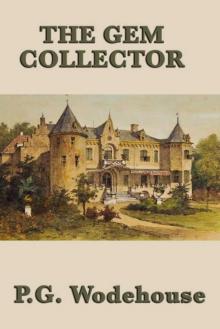 The Gem Collector
The Gem Collector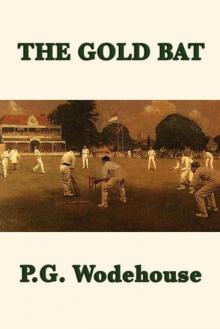 The Gold Bat
The Gold Bat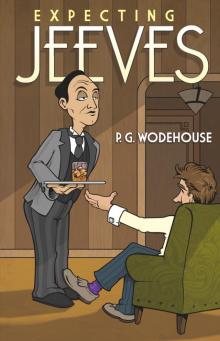 Expecting Jeeves
Expecting Jeeves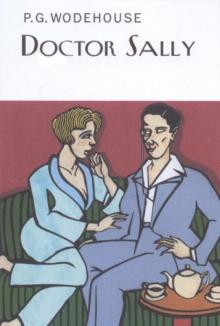 Doctor Sally
Doctor Sally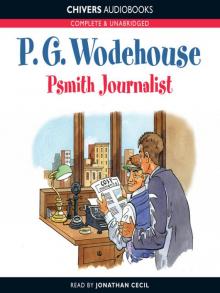 Psmith, Journalist
Psmith, Journalist The Golf Omnibus
The Golf Omnibus Heavy Weather
Heavy Weather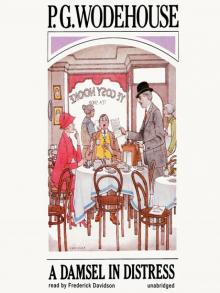 A Damsel in Distress
A Damsel in Distress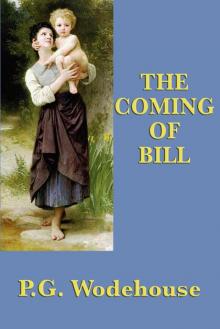 The Coming of Bill
The Coming of Bill Summer Lightning
Summer Lightning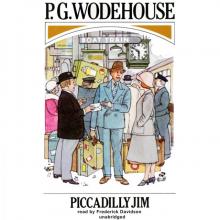 Piccadilly Jim
Piccadilly Jim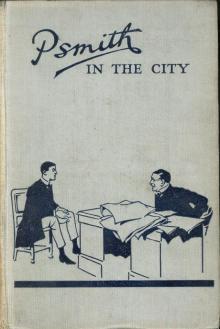 Psmith in the City
Psmith in the City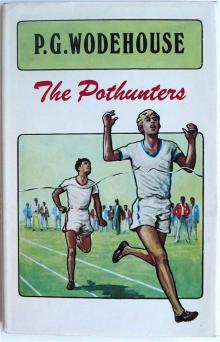 The Pothunters
The Pothunters Service With a Smile
Service With a Smile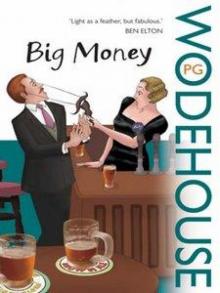 Big Money
Big Money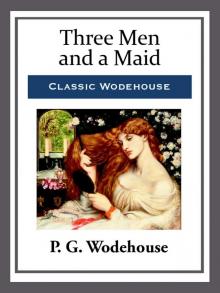 Three Men and a Maid
Three Men and a Maid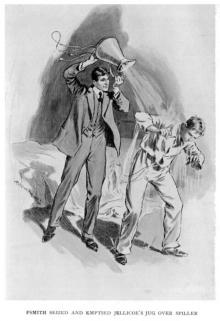 Mike and Psmith
Mike and Psmith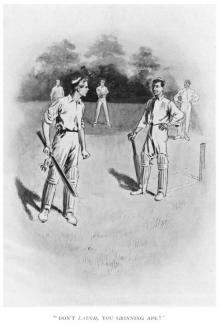 Mike
Mike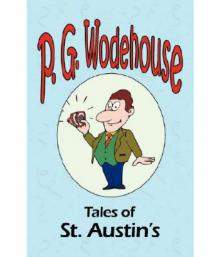 Tales of St. Austin's
Tales of St. Austin's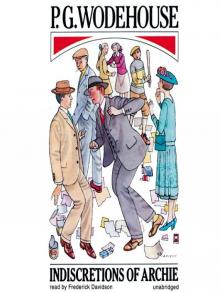 Indiscretions of Archie
Indiscretions of Archie Pigs Have Wings
Pigs Have Wings The Jeeves Omnibus - Vol 4: (Jeeves & Wooster): No.4
The Jeeves Omnibus - Vol 4: (Jeeves & Wooster): No.4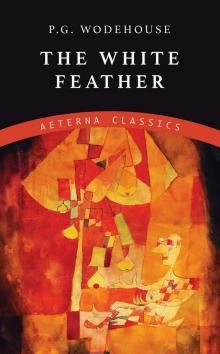 The White Feather
The White Feather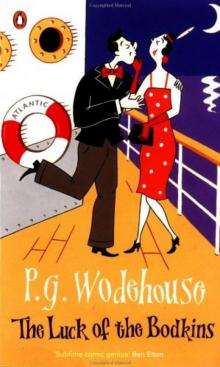 Luck of the Bodkins
Luck of the Bodkins THE SPRING SUIT
THE SPRING SUIT Full Moon
Full Moon Very Good, Jeeves
Very Good, Jeeves Thank You, Jeeves
Thank You, Jeeves Reginald's Record Knock.
Reginald's Record Knock. Wodehouse At the Wicket
Wodehouse At the Wicket LADIES AND GENTLEMEN V. PLAYERS
LADIES AND GENTLEMEN V. PLAYERS The Jeeves Omnibus - Vol 5: (Jeeves & Wooster)
The Jeeves Omnibus - Vol 5: (Jeeves & Wooster) The Jeeves Omnibus - Vol 1: (Jeeves & Wooster): No.1
The Jeeves Omnibus - Vol 1: (Jeeves & Wooster): No.1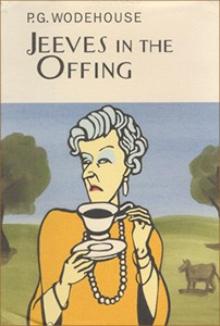 Jeeves in the offing jaw-12
Jeeves in the offing jaw-12